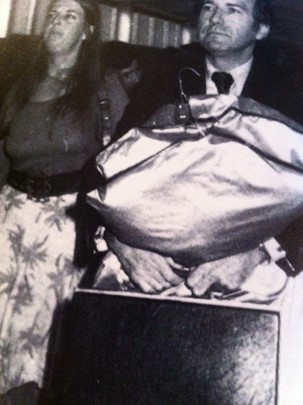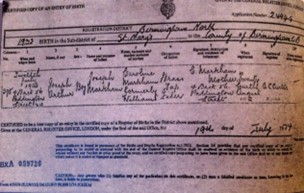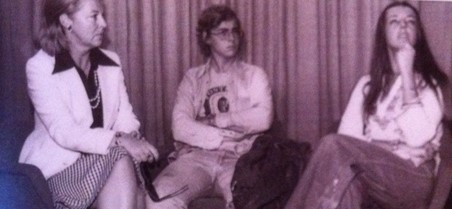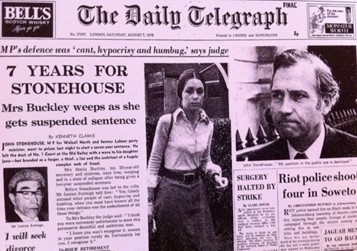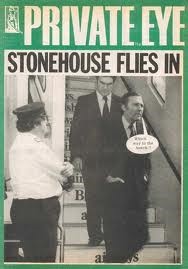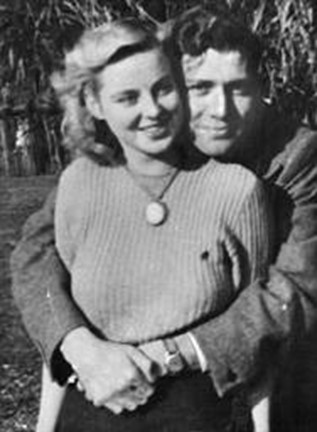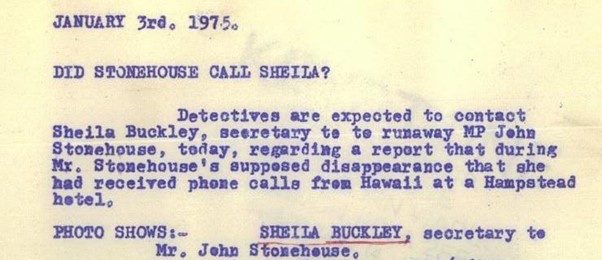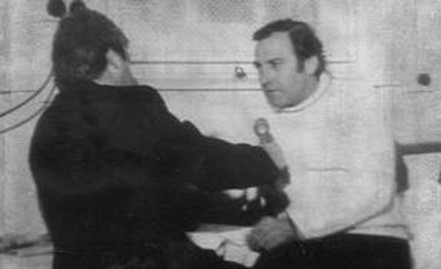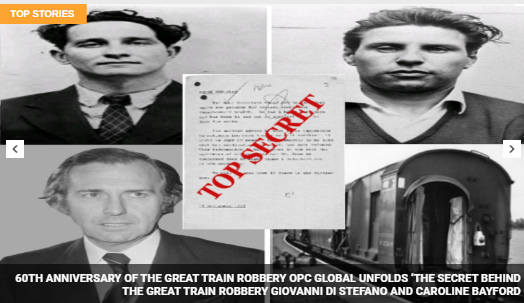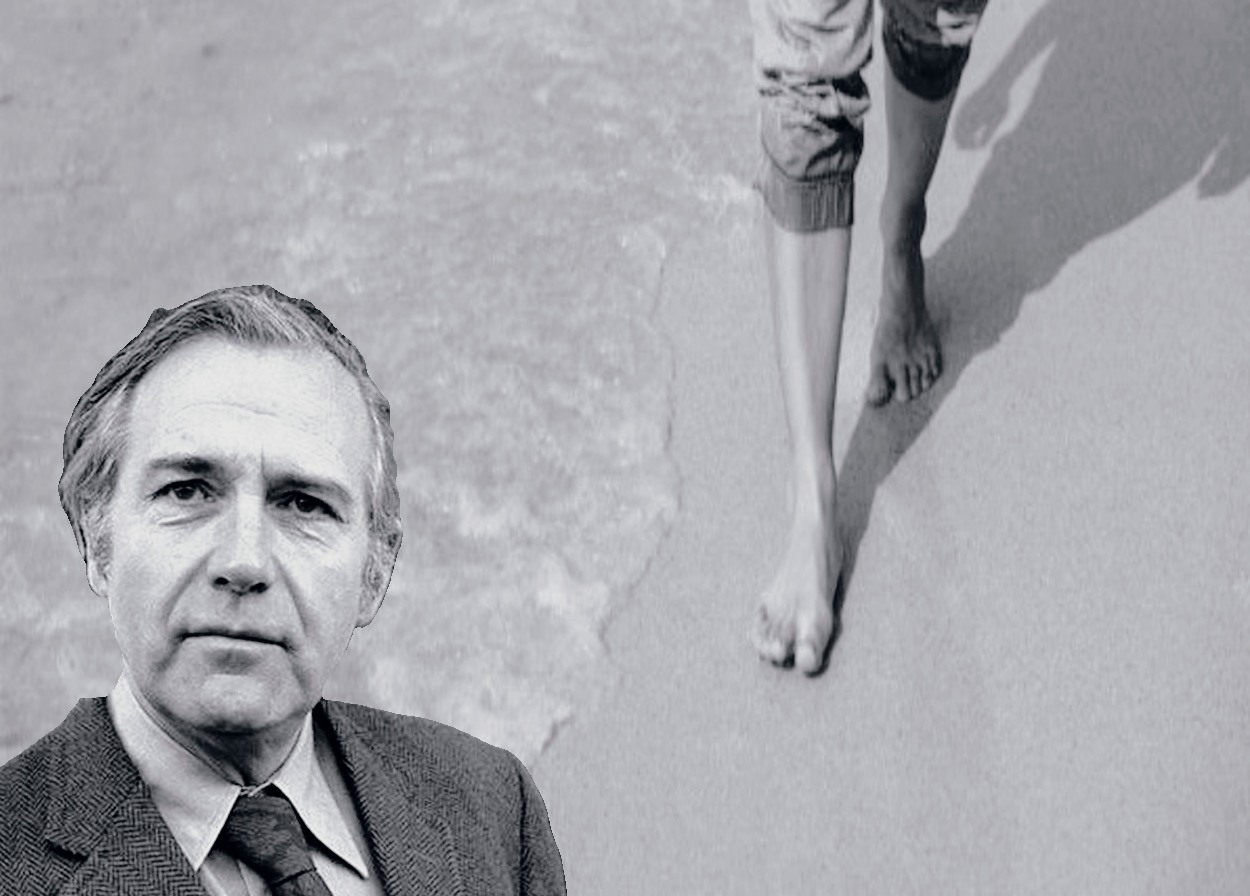
In Fredrick Forsyth’s novel The day of the Jackal the main character obtains a false identity by applying for a passport in the name of a dead man who would now be roughly his own age. All he needs to do is to get a copy of the man’s birth certificate, fill in the forms, and wait. Forsyth is renowned for his thorough research, and a number of people have copied his simple method.
John Stonehouse was a Forsyth fan.
The call to Melbourne police came shortly before Christmas Eve in 1974. Interpol had reason to believe Lord Lucan was in Australia and Melbourne’s finest, thought they had their man.
Several days earlier, detectives in the Australian city had been alerted to the presence of a handsome, well-spoken but furtive Englishman who was shuttling large amounts of money into a bank account from abroad.
When police pounced on their target’s luxury flat on Christmas Eve, what they found was not Lord Lucan but John Stonehouse, a 48-year-old British MP and former Labour minister, whose tale was just as captivating as that of the missing peer – and had unsettling implications for the British government.
Previously unseen documents, however, cast new light on the extraordinary saga of a man who wanted to be prime minister but ended up faking his own death, stealing the identity of a dead constituent, and became the subject of a diplomatic wrangle between London and Sydney.
The documents reveal how British diplomats working for Harold Wilson’s Labour government obtained a confidential psychiatric report on Stonehouse as he fought extradition on fraud charges.
The mystery had started on a Florida beach some 10,000 miles from Melbourne, 34 days before Stonehouse’s accidental discovery by detectives looking for Lord Lucan.
A pile of clothing belonging to the MP was found on a Miami waterfront after he had supposedly entered the water for a swim. Despite the absence of a corpse and FBI suspicions that the British politician, a former minister of aviation whose heavily indebted business empire stretched to 23 separate companies, had been the victim of a Mafia hit, it was rapidly accepted that Stonehouse had committed suicide.
For Wilson’s government, struggling to cope with an economy heading for meltdown as it entered 1975; there were more pressing matters to deal with. In the House of Commons, a ceremonial silence was held to mark the passing of the Honourable Member for Walsall North.
The idea that Stonehouse had “done a Reggie Perrin”, leaving his wardrobe on a beach for a new life in the manner of the as yet unbroadcast comedy starring Leonard Rossiter, did not attract much attention in Whitehall.
With inflation poised to hit 26 per cent, unemployment heading for a 30-year high and near-expulsion from the IMF looming, the Labour Party had little appetite for a major political scandal.
But that is precisely what it got when Stonehouse, 48, was detained for entering Australia on a false passport in the name of Joseph Markham, a dead constituent, and masquerading as Clive Mildoon, another deceased constituent.
Stonehouse, who was discovered in Melbourne with his attractive long-term mistress and former secretary, Sheila Buckley, immediately began a campaign against extradition to Britain to face fraud charges arising from his business dealings, which left a fund he set up to help Bangladeshi victims of a hurricane with £600,000 missing from its accounts.
His wife of 24 years, Barbara, was initially elated at the news of her husband’s return from the dead and flew out to Australia for an emotional reunion – only to learn of Sheila Buckley’s existence and her husband’s betrayal.
According to the new documents, the Black Country politician who fled to Australia via Hawaii, Singapore and Malaysia, rapidly set about constructing a defence, claiming he had been facing blackmail from South African business partners and suffered a “brainstorm” in Miami.
In a memo sent to the Foreign Office and seen by Wilson in Downing Street, Stonehouse said:
“My wish was to be released from the incredible pressures being put on me, particularly in my business activities and various attempts at blackmail. I considered, clearly wrongly, that the best action I could take was to create a new identity and attempt to live a new life away from these pressures. I suppose this can be summed up as a brainstorm or a mental breakdown.”
The case was manna from heaven for Fleet Street, which engaged in a mass scramble for a scoop. The Daily Express put 22 reporters on the story, including its cricket correspondent.
The News of the World dispatched nine journalists along with £15,000 in cash to buy Stonehouse’s story and The Times asked its Sydney-based opera writer to get on the trail of the MP.
But the British government was just as keen as the press to get to the bottom of Stonehouse’s motivation and likely next moves as he attempted to avoid extradition, trial and an eventual seven-year prison sentence.
By the time the time he stepped down as an MP in 1976, Stonehouse held the balance of power in Britain – his resignation put the Labour government, then headed by James Callaghan, in a minority with 315 seats compared to the 316 held by opposition parties.
The documents show that British diplomats in Sydney obtained a copy of a psychiatric report commissioned by Stonehouse and submitted to the Australian authorities to support his claim that he had suffered a mental breakdown.
A summary of the profile was sent to Mr Callaghan in 1975, when he was still Foreign Secretary, together with the following warning from an unnamed official:
“It is clearly important that Mr Stonehouse should not find out that we have been given an account of the contents of this report.”
The summary confirmed the MP’s claims that it was a form of breakdown that had provoked his decision to adopt a new identity. But it also revealed that Stonehouse was a Jekyll and Hyde character who had been posing as Joseph Markham for months prior to his disappearance to provide relief from being the MP he had come to hate. The summary stated:
“He believed he was ruined and evolved a bizarre scheme in 1974 to adopt a new identity. He spent short periods posing as Mr Markham, a private and ‘honest’ individual, which apparently led to reduced tension. He began to dislike the personality of Stonehouse and therefore devised his plan to escape.”
Arrest as a mistaken Lord Lucan represented the nadir of a dramatic fall for Stonehouse, the precocious son of two West Midlands Labour and Co-Operative Society activists who was only 31 when he entered the House of Commons. He was appointed Minister of Aviation in Harold Wilson’s first government at the age of 38 and then became postmaster-general.
As a young man, Stonehouse displayed a radical zeal, railing against colonialism and exploitation of the developing world. In 1959, he was expelled from Rhodesia for a speech in which he urged blacks to “lift your heads high and behave as though the country belongs to you”.
His efforts to highlight the independence cause of Bangladesh led to an offer of citizenship when the new state was declared in 1971.
Unfettered by modesty, Stonehouse declared to colleagues that his life plan was straightforward: become a millionaire and then prime minister. But despite being tipped for Cabinet, the MP’s political fortunes rapidly waned.
After Labour’s defeat in 1970, Wilson refused to appoint Stonehouse to any shadow ministerial post and the MP dedicated himself instead to a catalogue of disastrous business ventures.
By the time of his vanishing act in Florida in November 1974, Stonehouse had had debts of more than £800,000 after an attempt to set up a new investment bank in Bangladesh. He had also taken out a £170,000 insurance policy on his own life.
In Whitehall, the temptation to reduce the MP’s difficulties to a lifetime of psychological flaws proved difficult to resist.
The summary of the psychiatrist’s report said:
“The psychiatrist’s opinion was that, as a child, Mr Stonehouse was anxious and withdrawn, though undoubtedly gifted. He achieved success as a young adult but at the expense of personal strain and repression of his emotional needs and his ability to communicate his true feelings. In middle age, stresses in his career led to a degree of disillusionment with himself. Mr Stonehouse suffered significant but ‘atypical depression’. He thought of suicide but, deciding this was not the answer, devised a ‘suicide equivalent’ – his disappearance from a beach in Miami.”
The documents offer little evidence of just how the leaked psychiatric report was used by Downing Street or the Foreign Office. The government dossier includes a rambling 18-page submission sent by Stonehouse to the Queen in his role as a privy councillor, protesting his innocence with a note from one official advising that it be ignored.
Despite initial reluctance to deport Stonehouse, the Australian government eventually relented to British demands that the MP faces criminal charges in Britain and he was extradited in June 1975.
The papers detail a series of ranting memos sent by Stonehouse to senior Labour Party figures insisting he is the victim of wide-ranging conspiracy. They include a polemic against the press with uncanny echoes of the complaints of another politician who ultimately ended up in prison, former Conservative minister Jonathan Aitken.
In a letter to the then Leader of the Commons, Ted Short, Stonehouse blamed Fleet Street for his demise, writing:
“Press freedom is a false god to worship: it has become a weapon in the hands of callow, cynical and completely irresponsible men who delight in undermining and destroying active people in politics and business who are the constructive and positive elements in society. The negativism of much contemporary journalism is a cancer in the body politic and is gradually eating away at the vitals of British democracy.”
The MP’s trial on 18 charges of theft, forgery and conspiracy to commit insurance fraud lasted 68 days in 1976 and led to Stonehouse resigning from the Commons in August that year, forcing James Callaghan to form the Liberal-Labour pact to stay in power until Margaret Thatcher’s general election victory in 1979.
Suffering increasingly from a heart condition, Stonehouse served three years of his seven-year sentence before being released from prison early on grounds of health.
He married Sheila Buckley and set about a new career writing books, including an autobiography entitled Death of an Idealist. He died in 1988 from a heart attack at the age of 62.
The new documents suggest that Stonehouse had been broken by his experience in jail.
“Now it is a sad fact that John is put to cleaning out the lavatories – a job considered ‘light duties’ – and he carries out these tasks with his usual thoroughness no doubt. I am distressed that after over 30 years of 18 hours daily toil on behalf of the Labour Party, the Government and the country, John has so little support and aid in his time of need.”
The letter went unanswered.
It is a truism of British politics that if an MP is involved in a scandal it will centre around sex if he is a Conservative, and money if he is a Labour man, on the basis that few Conservatives have serious financial difficulties anyway.
This is borne out by Stonehouse, but what was truly scandalous was the way a respected politician planned and achieved his disappearance when life took a twist for the worse.
Read more on the shenanigans of John Stonehouse MP

